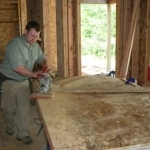It seems like its mostly the paint fumes. One woman I know said she can’t be in a room for 2 years after its painted. Does anyone have any resources they can post links to about this disease or about products that are less likely to affect someone who is sensitive?
Thanks.



















Replies
The problem I see with this issue is finding out which chemicals or compounds the customer is sensitive to. The customer needs to be able to give you specific information about their sensitivity(ies) so you (or they) can do some research.
Apparently, there are many people who think that they're sensitive, but really aren't. I was listening to Dr. Dean Edell recently and he was talking about some double blind studies that showed that a large percentage of "sensitive" people really aren't. - lol
I love listening to Dr. Dean. My wife and I listen to him every chance we get driving. I like Tom Douglas also on the weekends here in WA. He is a chef and even though I don't cook, I sure like to imagine what they are talking about ;-)
Thanks for the post. It was mostly an academic question.
I like Dr. Dean, too - although I sometimes wish he would put the soap box away. I've been wearing his reading glasses for several years now - in gradually increasing strength. - lol
Your question isn't really all that academic. Chemical sensitivities and being "green" are becoming "hot button" issues.
My comment regarding a customer needing to identify the specific cause(s) of their sensitivities was based on a conversation I had with someone about a remodel project a few weeks ago. A "friend of a friend" asked for my opinion because of a debate they were having with their contractor. Apaprently they were a little annoyed that he asked for a list of their specific problem chemicals and told them that his cost would have to change since he would need to spend time on research.
Yeah, I believe that there are indeed some folks with chemical sensitivities, but I suspect most are just making an emotional connection between sensing odors and having a physical reaction. Likely such people DO have some sort of chemical sensitivity, but they become "allergic" to everything with a "chemical" odor as a result, rather than just identifying and removing the specific chemical.
If your view never changes you're following the wrong leader
One thing i heard of somewhere was plain old plaster walls. When the top coat of plaster is troweled on it is pretty dense and doesn't really need paint.
I know a lady that has lots of allergies and she says Benjamin Moore is best paint for sensitive people. There is a company calle "Livos" I think, that has paints made with natural and non-toxic materials.
As Danno mentioned, Livos has products that work well for MCS folks.
Can't say the clear wood finish was much of a finish, but no ill effect from the bed I built. That lady even took raw wood samples home to sleep with to see if any were a problem. Settled on butternut with walnut accents.
She was previously familiar with Livos products. PAHS Designer/Builder- Bury it!
I hesitate to say this, but a possible source for information ( taken with a grain of salt) could be the church of Scientology.everybody knows how the Mormons make a big deal out of geneology so they are a source for that kind of research.Well, the Scientologists make a pretty big deal out of the chemical thing. We have a couple of Scientologist movie starts living here in summer and everything that goes into their homes needs to be approved by their "priests" as being safe. For one of them, I was refinishing the wood butcherblock top in the kitchen and had to get approval on the finish first.While there, I was asked to find the source of dead mouse smell and a way to keep mice out...I popped the base off a base cabinet and vacumned five gallons or more of shavins, and all the "stuff" that a hundred year old mouse colony can build up. Then I sprayed with chlorox and threw in a few mothballs before setting the baseboard back.Next morning I had a call!
Ooops, that was a BIG no-no.
Had to pop that base back off, retrieve the mothballs and rinse the clorox and .....
Welcome to the Taunton University of Knowledge FHB Campus at Breaktime. where ... Excellence is its own reward!
> One woman I know said she can't be in a room for 2 years after its
> painted.
You would want more information about the specific chemicals to which she is sensitive. Sounds to me that she is sensitive to ethers; in that case, an oil-based paint or milk paint would work much better for her.
Tim,
My wife has it, and a few years back I asked about MCS here and got some good responses, websites and products. I am a computer Neanderthal and don't know how to provide you a link, but the thread number is 42452.1 Use the advanced search and plug in that number.
Some other websites that we have looked over in the past are The Healthy House Institute http://www.hhinst.com and the Chemical Injury Information Network at http://www.ciin.org
There is truth to both sides as to MCS. As somebody in the other thread put it, "some of these people put the "mental" in environmental". DW got a laugh out of that when I showed it to her. But having lived with it, the reality is hard to deny.
Bowz
Bowz,
Took part in building a house for a family of 4 that suffered formaldehyde poisening for a Trailer House back in the early eighties. No fiberglass, no formica, no carpets, no sheetrock , no products containing any formaldehyde at all. Added to that a life long sensitivity to paints, lacquers, most wood finishes , some concrete additives. Concrete consisted of sand/gravel, cement and water.
The stuff the family would have reactions to was endless. EPA tested their trailer 2 years after they moved out and when they moved out they popped open every door and wiondow. Tested out at 500 times the safe average after 2 years of airing out. Chemical sensitivity is real and often caused by continued exposure to the chemicals in building materials. All 4 of that family will suffer for the rest of their lives and I mean serious suffering , bottled oxy , loss of income producing jobs, liver failure, ashma ."Poor is not the person who has too little, but the person who craves more."...Seneca
Yeah, formaldehyde is one of the "real" sensitivities. Can build up in sensitive folks and cause a number of problems, including liver damage and cancer. But, due to these issues, standards (not sure whether official or "voluntary") were instituted in the late 80s, I think it was, to greatly reduce formaldehyde in building materials.Trailers were one of the worst situations for high formaldehyde levels, prior to these standards.The other likely offenders are mostly solvents -- benzene, acetone, etc -- and mold toxins. Most of these chemicals (including formaldehyde) poison by mucking up the delicate chemistry of cell metabolism. Individuals may be more sensitive than normal to them because of oddities in their cell metabolism (minor genetic defects in mitochondrial DNA, eg) or because their livers lack (again due to genetics) the "pathways" needed to "detox" them. Someone with a genetic predisposition (or severe occupational exposure) can become further "sensitized" by having some of these pathways permanently damaged.Re formaldehyde, although it's a fairly smelly chemical, in sensitized folks it can cause problems just at or even below the odor threshold. This tends to make these folks fear any hint of "chemical" odor, since most people are not good at distinguishing such odors.
If your view never changes you're following the wrong leader
Probably the most thourough book I've read on the subject is "Perscriptions for A Healthy House" by Laporte, Elliott and Banta - ISBN:0-86571-434-7.
Another good one, not so much about building, but a nice overview on the subject of (un)healthy himes is "My House is Killing Me" by Jeffrey C. May - ISBN:0-8018-6730-4.
A really helpful guide for finding non toxic products is "Green Building Products" by Wilson/Piepkorn - ISBN:0-86571-543-2.
There is little question in my mind that living in the average house built in the past 30 years is similar to eating fast food every day - it's affordable, but it's not the healthiest choice. Huck said it first. I just agreed with him.
That was me. <G>http://forums.taunton.com/n/main.asp?webtag=tp-breaktime&msg=42452.1&find=SearchAs I mentioned there, I'm all for building carefuly and meeting people's needs and wants to the best of our ability.And a smart contractor will be careful. I learned this the hard way.
thanks for the link.
An example of the customer to avoid: I looked at a kitchen remodel once, and the lady of the house insisted that the cabinets be made with solid wood. I explained about the dimentional stabilty of plywood, and particle board.
She explained that she didn't want any formeldehyde in her house. I got lectured about the evils of chemicals, and told how everyone who has manufactured cabinets is going to die of cancer.
At this point she lit up a cigarette and started puffing away, continuing to state the evils of chemicals. I can still see her in my mind with that burning cigarette between her two fingers pointing at me and repeating how everyone with manufactured cabinets is going to die of cancer.
I just kept thinking, "Get me out of here, this woman is disconnected from reality."
Bowz
That's one for the books. <G>I was building green many years before it became popular, it is a career-long pursuit for me, and I still work pretty much continually to get better at it.But my oh my do we attract some fruit-bats. I guess that happens at the fringe of every movement.Speaking of how chemicals are bad for you, there was a great spoof going around last year about the evils of di-protium oxide. It's known to cause asphyxia in fairly low doses with brief exposure, large doses can result in chronic nutritional imbalance, and in fairly small amounts over long periods of time it is the primary cause of all kinds of structural failures.And those chem-trails coming off of airplanes that the government is trying to tell you are harmless? Yep -- more di-protium oxide. The government is allowing the airlines to put massive doses into the atmosphere.I don't know how I keep a straight face sometimes.
Di-hydrogen oxide is so dangerous to the young that warnings are required on every container that *can* contain it on the off chance that it *might* someday contain some.SamT
<G>I tried drinking it one time. I went back to beer, it seemed safer.
Well, no kidding. Di-hydrogen Oxide can be a serious hazard, and besides, as the great chemist W.C. Fields once said, "fish fornicate in it." Another reason to stick with beer or bourbon.
On edit: that said, most of the folks I've met with "allergy issues" are goofy as a sh%^house rat. Deal with it.
Edited 10/9/2007 9:49 pm ET by cowboyneal
Bourbon, here. 18 year old Elijiah Craig seems to have had enough time and potencey to work all those pesky chemical problems out.I'm about as sympathetic to the idea of green building as anyone you'll ever meet, and have been somewhat successful at it. Through a long association with a chemist/biologist who has a lifelong career interest in all things ecological, I'm pretty conversant with the science.And yes, most of these clients are in fact as crazy as sh#thouse rats. <G>
been away and just saw your posting. I've done some MCS work. I'm not sure if I want to do much more. It is pretty much impossible to supply a list of chemicals that MCS people are sensitive to. They are always evolving, and generally don't get better,, but worse. (there are some that get better). I use the CMHC publication, building materials for the environmentally hypersensitive,, which is a sort of guidline. Last work I did was Diamond veneer plaster on "blue board" or "grandprix board". no paint. Some paint that seems to work is Farrow and Ball clay based. But beware the pigments. This whole line of work is such a can of worms,, it really goes beyond explaination. Please feel free to contact me directly at [email protected] if there is anything I can help with!
We did a desk for a doctor that speciallized in this. It had to be made of glass and steel. Everything had to be confirmed not to have been cleaned,oiled, stored in a musty place etc. We had to come to work that day having not used cologne or pit rub. We got the desk in place and set, then my salesman promply walked in with a bottle of windex. Thankfully we caught him before he sprayed and the whole office would have had to have been emptied. The doc was plssed that the bottle had even passed through his door.
Also, a local source for some things that may be acceptable.
http://www.environmentalhomecenter.com/
Yeah,, did a cover out of glass for an existing desk,, foil wrapped the rest. She reacted to the cutting compound from the glass shop sander. I had cleaned it with Bio soaps for a couple of hours,, but still no go.
Crazy as barnyard rats? Quite often,, but sometimes you can help!Its a horse thing!